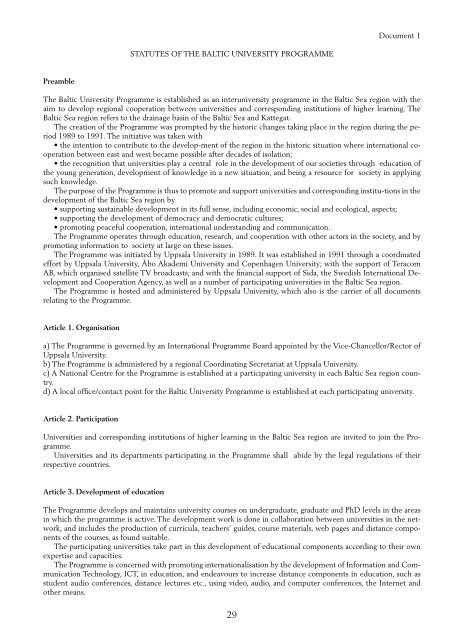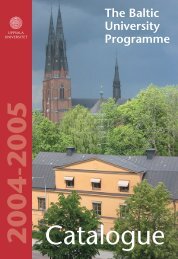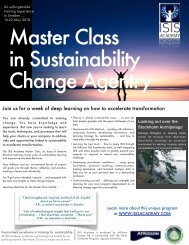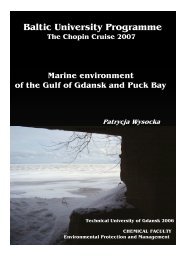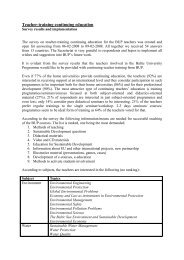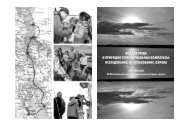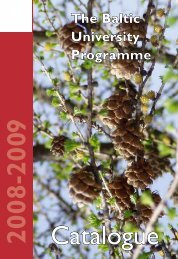Conference booklet - Baltic University Programme
Conference booklet - Baltic University Programme
Conference booklet - Baltic University Programme
You also want an ePaper? Increase the reach of your titles
YUMPU automatically turns print PDFs into web optimized ePapers that Google loves.
Document 1STATUTES OF THE BALTIC UNIVERSITY PROGRAMMEPreambleThe <strong>Baltic</strong> <strong>University</strong> <strong>Programme</strong> is established as an interuniversity programme in the <strong>Baltic</strong> Sea region with theaim to develop regional cooperation between universities and corresponding institutions of higher learning. The<strong>Baltic</strong> Sea region refers to the drainage basin of the <strong>Baltic</strong> Sea and Kattegat.The creation of the <strong>Programme</strong> was prompted by the historic changes taking place in the region during the period1989 to 1991. The initiative was taken with• the intention to contribute to the develop-ment of the region in the historic situation where international cooperationbetween east and west became possible after decades of isolation;• the recognition that universities play a central role in the development of our societies through education ofthe young generation, development of knowledge in a new situation, and being a resource for society in applyingsuch knowledge.The purpose of the <strong>Programme</strong> is thus to promote and support universities and corresponding institu-tions in thedevelopment of the <strong>Baltic</strong> Sea region by• supporting sustainable development in its full sense, including economic, social and ecological, aspects;• supporting the development of democracy and democratic cultures;• promoting peaceful cooperation, international understanding and communication.The <strong>Programme</strong> operates through education, research, and cooperation with other actors in the society, and bypromoting information to society at large on these issues.The <strong>Programme</strong> was initiated by Uppsala <strong>University</strong> in 1989. It was established in 1991 through a coordinatedeffort by Uppsala <strong>University</strong>, Åbo Akademi <strong>University</strong> and Copenhagen <strong>University</strong>; with the support of TeracomAB, which organised satellite TV broadcasts; and with the financial support of Sida, the Swedish International Developmentand Cooperation Agency, as well as a number of participating universities in the <strong>Baltic</strong> Sea region.The <strong>Programme</strong> is hosted and administered by Uppsala <strong>University</strong>, which also is the carrier of all documentsrelating to the <strong>Programme</strong>.Article 1. Organisationa) The <strong>Programme</strong> is governed by an International <strong>Programme</strong> Board appointed by the Vice-Chancellor/Rector ofUppsala <strong>University</strong>.b) The <strong>Programme</strong> is administered by a regional Coordinating Secretariat at Uppsala <strong>University</strong>.c) A National Centre for the <strong>Programme</strong> is established at a participating university in each <strong>Baltic</strong> Sea region country.d) A local office/contact point for the <strong>Baltic</strong> <strong>University</strong> <strong>Programme</strong> is established at each participating university.Article 2. ParticipationUniversities and corresponding institutions of higher learning in the <strong>Baltic</strong> Sea region are invited to join the <strong>Programme</strong>.Universities and its departments participating in the <strong>Programme</strong> shall abide by the legal regulations of theirrespective countries.Article 3. Development of educationThe <strong>Programme</strong> develops and maintains university courses on undergraduate, graduate and PhD levels in the areasin which the programme is active. The development work is done in collaboration between universities in the network,and includes the production of curricula, teachers’ guides, course materials, web pages and distance componentsof the courses, as found suitable.The participating universities take part in this development of educational components according to their ownexpertise and capacities.The <strong>Programme</strong> is concerned with promoting internationalisation by the development of Information and CommunicationTechnology, ICT, in education, and endeavours to increase distance components in education, such asstudent audio conferences, distance lectures etc., using video, audio, and computer conferences, the Internet andother means.29


